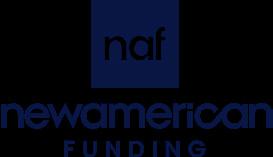








Experience a Better Homebuying Journey. Experience New American Funding.
• You Talk, We Listen: The foundation of a great home loan experience begins with understanding your needs. We’re here to listen and guide you every step of the way.
• You Live Here, We Live Here: Your home loan journey starts with people who live and work in local Iowa communities.
• You Need a Professional, We’re Here to Help: Our Mortgage Lenders adhere to exceptional standards in customer care and are supported by a dedicated team of processors, underwriters, and funders.
• You Want Options, We Have Many: Whether it’s your first home or your dream home, we offer a wide variety of programs and loan products.
We Want Your Business! The Only Way to Earn It is by Proving Our Value.


We understand that it can be difficult to find the right home for you and your family; but understanding your mortgage payment shouldn’t be. That’s why we’ve broken down your loan payment below.
The actual amount you’re borrowing. A part of the principal is being paid back with each mortgage payment.
What it costs to borrow money for your home, which is in addition to the principal.
Real estate (or property) taxes, which are paid to local governments. Lenders may be able to set up taxes to be collected through monthly payments or you may be able to arrange the payments on your own.
Also known as hazard insurance, this protects the homeowners against unexpected events that affect the home and may cover repairs, replacements or even a rebuild up to a preset amount.
Mortgage insurance is an insurance policy that compensates the lender for losses due to a defaulted mortgage loan.
Certain dwellings like condos and townhomes charge assessments for the upkeep of common areas and amenities. These dues, called association dues, are not included in the mortgage payment.


Before you start looking at houses, work with your loan officer to get Pre-Approved, which will let you know how much home you can afford.
This can help you narrow your home search to houses within your budget, give you an idea of how much you’ll need for a down payment, and help you identify budgeting goals to work toward.
• Your lender will look at your credit, income, debt, savings and assets to determine what loan amount you can qualify for.
• As a general rule, your monthly housing expense should not exceed 28% of your gross monthly income.*
• While getting Pre-Approved can be a big advantage before your home search, it’s not a guarantee for a loan. Getting fully approved for a mortgage happens later in the process.
Once you get Pre-Approved, we will send you a Pre-Approval letter to pass along to your Real Estate Agent so you can start looking for a home!
*Source: Investopedia.com


For first-time buyers, buying a home can seem overwhelming. Knowledge is power, so we’ve provided five easy steps to make the process less intimidating.
Get started on the right foot by getting pre-approved to determine how much home you can afford. Submitting a pre-approval letter with an offer makes a bigger impression.
Once the buyer and seller agree to price, terms and have a signed contract, you will receive a loan estimate that will explain the costs or the mortgage. In order to proceed, you will need to decide on a loan program, gather personal documentation and sign all loan documents needed.
You are either able to lock in your interest rate at application or choose to lock it in later. We can assist with determining the best time to lock in the rate, depending on the closing date of the contract. Since these rates fluctuate daily, it can be beneficial to secure the rate sooner than later.
Once you’ve submitted your loan application, it triggers a series of events that must take place before you get your loan approval:
a. Appraisal - a licensed third party will evaluate the value of the property.
b. Title and Escrow - real estate attorneys will typically order these services and forward the results to New American Funding for the closing package.
c. Underwriting - Once the loan file is compiled, the underwriter reviews the application to make the final decision to approve or deny the loan and ensure your mortgage meets current loan product guidelines.
Closing is when your contract is finalized and you sign the documents that make you an official homeowner! We will review the closing disclosures, ensure you have the proper amount for a down payment and do a final walk-through 24 hours in advance of the closing.
Fixed Rate: Provides a fixed rate throughout the life of the loan. This may be a better choice if you want stable payments and plan to live in your home long-term.
ARMs: With adjustable rate mortgages (ARMs), the interest rate can fluctuate, which will affect your monthly payment, but can be a good option for short-term stays.
FHA: Federal Housing Administration (FHA) loans allow you to purchase with as little as 3.5% down, which requires borrowers to pay a mortgage insurance premium.
VA: Backed by the U.S. Department of Veteran Affairs, VA loans require no down payment and no mortgage insurance. These are available to eligible veterans, active duty members, reservists, National Guard members, and surviving spouses.
USDA: Backed by the U.S. Department of Agriculture, USDA loans are available for homes in eligible rural areas. USDA loans do not require a down payment, but do require mortgage insurance.
IFA: The Iowa Finance Authority (IFA) offers down payment assistance, first-time home buyer advantages, and friendly mortgage rates to those who qualify.
Here are some steps to avoid unless you’ve closed on your home; these could impact your final closing, even if you’ve already been approved!
Interest rates and credit scores are directly linked, so it is best to minimize the number of times your credit is pulled.
A new monthly payment may affect what loan amount you qualify for, which may impact your ability to qualify for a mortgage entirely.
This can lengthen the verification process. If necessary, keep all receipts and clearly show where the money is deposited.
Many loan programs require a two-year work history and changing jobs can create qualification problems, especially if the pay is different than your current job.
This list doesn’t cover everything, but it is a great start to a smooth approval process. Consult a credit advisor for a comprehensive list of things to avoid.


It takes a lot of important people to make your mortgage process run smoothly and it’s important to know who will be involved.
Appraiser
Determines the market value of a property.
Buyer’s Agent
Negotiates the best pricing and terms for the buyer.
Home Inspector
Inspects the property for any issues with a property, including structural, plumbing, electrical, heating/ cooling, etc.
Insurance Agent
Assists buyers in purchasing homeowners insurance.
Listing Agent
Represents current homeowners when trying to sell their home.
Real Estate Attorney
Specializes in buying and selling real estate properties.
Title Company
Independent agency that issues unbiased title documents.
NAF Loan Consultant
Works with you to set up the best loan structure for your needs.
Use our checklist for information needed to process your application:
Copy of Driver’s License/ID
Last two year’s W2s and tax returns (all schedules)
Last two month’s bank statements (all pages)
Last 30 day’s pay stubs
Business tax returns and K1s for two years (if self-employed)
Realtor’s contact information
Insurance Agent’s contact information



The gradual repayment of a mortgage loan by installments.
Annual Percentage Rate (APR)
The actual cost of a mortgage stated as a yearly rate including such items as interest, mortgage insurance and closing costs required by the lender and title company.
An opinion of a property’s fair market value based on an appraiser’s knowledge, experience and analysis of the property.
An increase in the value of a property due to changes in market conditions or other causes. The opposite of “Depreciation.”
Expenses (over and above the price of the property) incurred by buyers and sellers in transferring ownership of a property. Buyer’s closing costs typically include fees for application, processing, underwriting, flood certification, transfer taxes (where applicable), title company, interest, tax & insurance escrows and attorney.
Closing Disclosure (CD)
Explains the cost of the transaction. This document must be given to the consumer 3 days prior to closing which ensures no surprises at the closing table.
These are loans that are sold to government sponsored enterprises, Fannie Mae and Freddie Mac.
Conventional loans are not insured by any government program such as FHA, VA, or USDA. Conventional loans are the most common type of mortgage.
of Veterans Affairs (VA)
VA loans are guaranteed by the U.S. Department of Veterans Affairs. VA loans are offered to eligible American veterans or their surviving spouses.


An account into which deposits for real estate taxes and insurance (mortgage insurance, hazard insurance and flood insurance as applicable) are made as part of the monthly mortgage payment. The mortgage servicer pays the taxes and insurance out of the account when due. The consumer receives an annual escrow analysis stating all funds paid into and out of the account.
FHA loans are designed for borrowers who are unable to make a large down payment. These loans are insured by the Federal Housing Administration.
This insurance, also known as homeowners insurance, protects homeowners against unexpected events that affect your home. Replacement cost coverage ensures that your home will be fully rebuilt in case of a total loss.
A person’s financial obligations. Liabilities include long-term and shortterm debt, as well as any other amounts owed to others.
This document is provided to consumers within three business days after a completed application is received. The LE provides important information including an estimated interest rate, monthly payment and closing costs for the loan.
The loan application is a detailed form designed to provide information to originate your loan. Lenders use the application to evaluate whether or not they can give you a loan and if so, the amount of money they can lend you. The loan application form requests information such as bank account balances, employment and income information and liabilities.
The relationship between the principal balance of the mortgage and the appraised value of the property. For example, an $80,000 mortgage on a home valued at $100,000 has an LTV of 80% ($80,000/$100,000). The remaining $20,000 is your down payment.
A written agreement in which the lender guarantees a specified interest rate if a mortgage goes to closing within a set period of time.
An institution involved in the origination, processing, underwriting and funding of mortgage loans. A mortgage banker may or may not service the loans it originates and funds.
A policy that insures the lender against loss caused by a mortgagor’s default. Mortgage insurance can be issued by a private company or by a government agency such as the FHA.
The process of estimating how much money a prospective home buyer will be able to borrow before they apply for a loan.
A loan which is serviced by the lender that issued the money.
A legal document evidencing a person’s right to, or ownership of, a property.
Insurance that protects the lender (lender’s policy) or the buyer (owner’s policy) against loss arising from disputes over ownership of a property. Your lender will require that you purchase a lender’s policy. The seller typically purchases an “Owner’s Policy” for the buyer.
State or local tax payable when title passes from one owner to another.
The process of final evaluation of a borrower’s loan application to determine whether or not the application meets the lender’s guidelines by assessing the borrower’s ability to repay the loan based on an analysis of their credit, capacity and collateral.